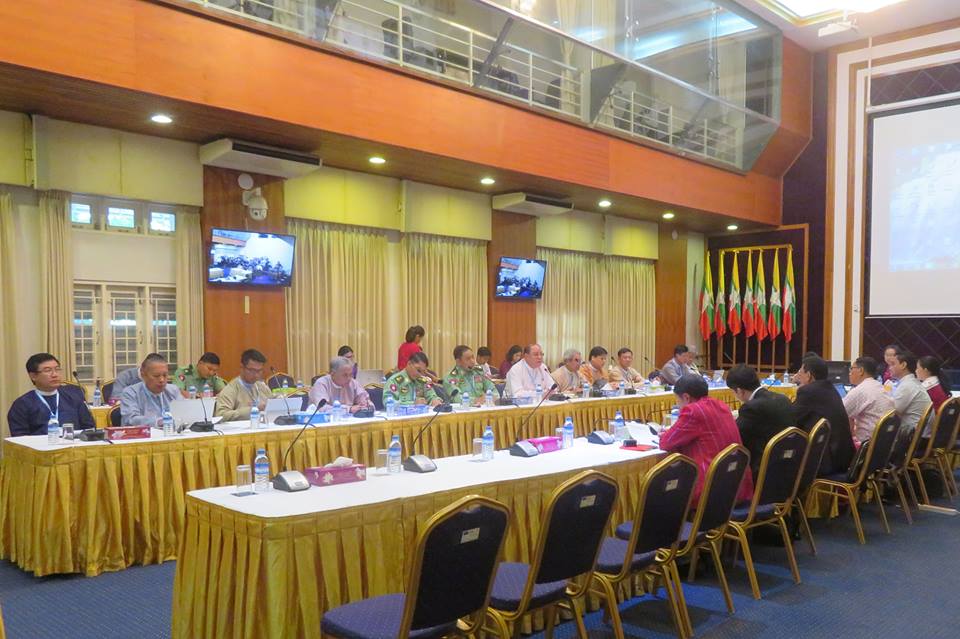A disagreement over simple terminology is grinding peace talks to a standstill, according to Tun Zaw, a central executive member of the ethnic bloc United Nationalities Federal Council (UNFC).
Speaking to DVB on Tuesday, Tun Zaw said that the UNFC could not see the peace process moving forward unless it resolved the deadlock over Point 2 of its 9-Point Proposal [also referred to as an *8-point plan as the ninth point is simply titled ‘Conclusions’], which was submitted to both the government and military in March 2017.
The UNFC maintains that Point 2 should be worded: “the establishment of the Nation of a Federal Democratic Union, which fully guarantees the rights of national equality and self-determination on the basic of freedom, equality and justice, and in accordance with the Panglong Spirit.”
[related]
However, said Tun Zaw, military representatives insist the adopted terminology reads: “Nation of Democratic and Federal Union.”
He noted that the government’s Peace Commission and the UNFC’s Delegation for Political Negotiation have now met for negotiations on no less than seven occasions, but cannot come to an agreement.
“The situation is deadlocked because of this wordage,” he said yesterday. “Our signing the NCA [nationwide ceasefire agreement] is dependent upon agreement over the nine points. Nonetheless, we will continue to engage in dialogue until we resolve all outstanding issues.”
Following the resignation of the Shan State Progress Party in August last year, the UNFC now consists of just four ethnic armed groups—the New Mon State Party, the Karenni National Progressive Party, the Lahu Democratic Union, and the Arakan National Council. None is signatory to the NCA.
Over the past years, including during the tenure of the civilian Aung San Suu Kyi-led administration, Burma’s peace talks have often been a laborious process. Despite hundreds of meetings between the government, military and ethnic armed groups, few results or agreements have emerged, and armed conflict continues unabated in the east and northeast of the country.
The government has put pressure on the remaining members of the UNFC to move the process forward by signing the NCA.
Recently, the Karen National Liberation Army (KNLA), military wing of Karen National Union (KNU), which is an NCA signatory, announced that they want the upcoming Third Session of the Union Peace Conference to be suspended. The summit is scheduled for the end of January.
Col. Saw Roger Khin of the KNLA said that his group came to the decision after a meeting at its headquarters on 5 January. He further stated that most ethnic factions share a similar opinion and may refuse to join the third round of the Union Peace Conference, widely known as the 21st Century Panglong Conference.
Another armed group, the Restoration Council of Shan State/Shan State Army (RCSS), announced on 8 January that National-level Political Dialogue scheduled to be held in Langkho on 12-14 January – which the RCSS was due to host – has now been suspended.
“The reason for temporarily postponing the national-level dialogue is that we have not managed to gather the collective voices of ethnic Shan people,” said Maj. Sai Oo, an RCSS/SSA spokesperson, speaking to DVB. “Public consultations in Panglong, Tachileik, Kyaukme and Kunhing have all been obstructed [by the Burmese military or Tatmadaw]. The Shan state government granted permission for these events, but the Tatmadaw prevented them, saying they were acting on orders from their superiors.”
He said the RCSS has not yet decided whether or not it would attend the upcoming peace conference.
*The four principles agreed at the DPN-Peace Commission meeting on 10-11 August 2017:
- The Burmese government and military will declare a nationwide ceasefire within 24 hours of an NCA being signed;
- A federal union will be established with equal rights and autonomy;
- Political dialogue will be all-inclusive at every level;
- Constitutional laws may be drafted and promulgated based on the outcomes of the 21CPC [peace talks].
Four points remain to be discussed:
- Military code of conduct (COC) and monitoring the terms of reference (TOR)
- Formation of a neutral enforcement tribunal for the NCA involving domestic and international representatives who are acceptable to both sides;
- Formation of Joint-Monitoring Committee with representatives from government, ethnic armed groups and international figures acceptable to both sides;
- Any development projects planned for ceasefire areas are to undergo consultation with the public and ethnic armed groups.



